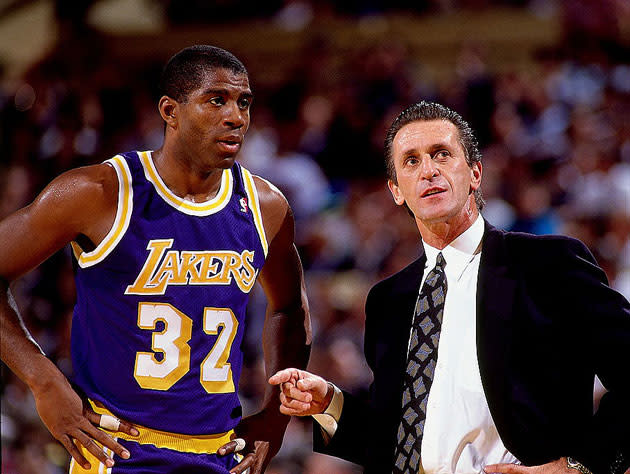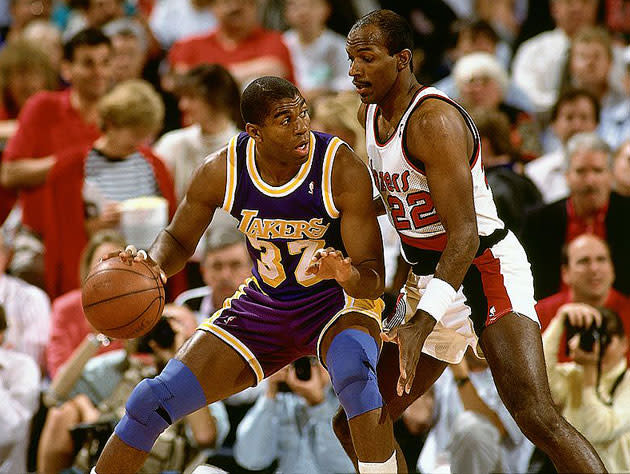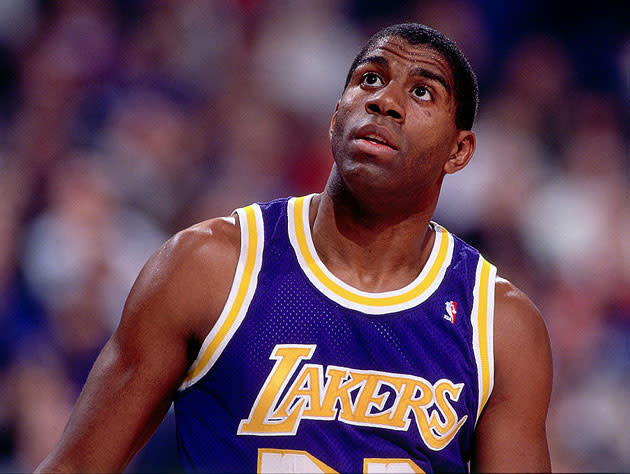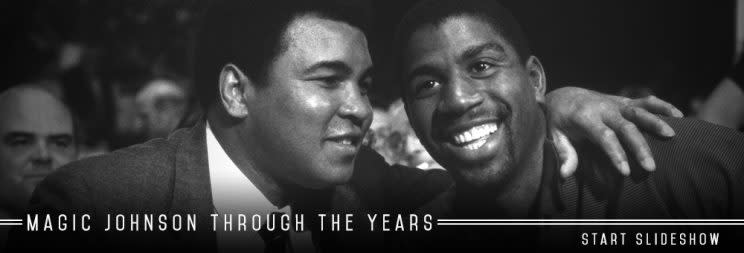In the years before his HIV diagnosis, Magic Johnson was as brilliant as ever
The typical arc of the story’s re-tell has Magic Johnson, clutching a pained left hamstring, truly limping away from the NBA in 1989. The two and a half years spent between that supposed denouement as a player, suffered in Game 2 of Los Angeles’ title defense against Detroit in the NBA Finals, and Magic’s HIV diagnosis in 1991 have remained largely forgotten. It’s understandable, as we tend to let the larger moments overshadow the relatively significant, but that shouldn’t excuse it.
[Join a Yahoo Daily Fantasy Basketball contest now | Free NBA Yahoo Cup entry]
Magic Johnson wasn’t some too-slow, ill-fitting reminder of a previous era from 1989 through 1991. He didn’t act as some proto-version of Vlade Divac, milking every lope up court on his way to a low post that could have been ordered on special from the YMCA your father-in-law shoots at. His appearance in the 1991 NBA Finals wasn’t a token goodbye, nor was it an upset fling for the Lakers. His 1989-90 Most Valuable Player award wasn’t handed to him solely due to a raft of dodgy math.
Johnson’s HIV diagnosis was revealed on Nov. 7, 1991. He retired “from the Lakers” (and not the NBA, or the game, by his terms) in a nationally-televised press conference and, save for cameos during the 1992 exhibition season and during the 1995-96 regular season and playoffs, stayed away from the team’s active roster. That’s the burn that remains, as the bigger story isn’t always the most descriptive one.
Following that 1989 Finals loss to the Detroit Pistons, and prior to his retirement, Magic Johnson played some of the best basketball of his career. He was a dominant star carrying a less-vital franchise through the pain of Kareem Abdul-Jabbar’s final season, and his Showtime teammates’ declining years.
His move to walk away in late 1991, at the time, felt like a death sentence for Magic Johnson. As we’ve learned in the quarter century since then, as Johnson continues to act and appear as happy as any 57-year old man should be allowed, the diagnosis appears more like an uncalled for (and still, in a smaller sense, tragic) move to limit the scope of one of the best careers in basketball history.
[ | Mock Draft | The Vertical | Latest news]
Those 1989 Finals, even without the left hamstring pull, have been similarly washed away; dutiful to narrative. The Lakers barely beat the upstart Pistons in the 1988 Finals, needing what should have been a crippling Isiah Thomas ankle injury and seven games to top a young and talented team that had been on the rise for years.
By the time 1988-89 began, it was all but assumed that the Pistons would have some measure of revenge come June. The Boston Celtics (whom the Pistons swept in the opening round in 1989) were too old to get in the team’s way out East, the Atlanta Hawks too unsure prior to its first round upset at the hands of Milwaukee, and a Doug Collins-led Chicago Bulls team just wasn’t ready. Even after the Bulls topped what appeared to be Detroit’s chief Eastern contender in the Cleveland Cavaliers.
Los Angeles, after pulling off the NBA’s first back-to-back championship run in nearly two decades, were expected to act as token Finals fodder. Paid to work toward its symbolic 1989 Finals defeat at the hands of a Pistons team that probably should have won it all in 1987-88.
Magic, and Laker coach Pat Riley, wasn’t having any of it.
[Follow Dunks Don’t Lie on Tumblr: The best slams from all of basketball]
Working in Kareem Abdul-Jabbar’s final season, the Lakers won 57 games in a loaded Western Conference. Magic contributed 22.5 points, 12.8 assists (which was good only for second in the NBA, behind John Stockton) and 7.9 rebounds a contest. Working at age 29, Magic led a Laker team still reliant on its Showtime heroes – 20-point scorer James Worthy, Byron Scott, A.C. Green, sixth man Michael Cooper – through an unexpected Western Conference traipse once the postseason hit.
The Lakers didn’t lose a game out West, toppling the Trail Blazers, SuperSonics and Suns in a triptych of sweeps during the first three rounds. It was an astonishing performance, led by Magic’s 20.3 points, 12.8 assists and 6.5 rebounds.
With Detroit battling Chicago in a grueling six-game Eastern Conference finals series in the East, Lakers coach Pat Riley infamously put his Lakers through the paces in practice following its Western finals win. With eight days of space between Los Angeles’ sweep of Phoenix and Game 1 of the Finals, the Lakers went all out behind closed doors; and it cost them. Byron Scott severely pulled his hamstring in practice and would be out for the Finals.
After Game 1’s loss, with Cooper starting, Magic fell in Game 2:
The hamstring pull would leave Johnson sidelined, save for a short burst in Game 3’s opening minutes, for the series. The Pistons went on to sweep, but only topped the Lakers by a total of 27 points in the series despite Los Angeles working without Magic for all but a game and a half and Scott (who averaged nearly 20 points per game in the regular and postseason, and was the perfect size to match Detroit All-Star Joe Dumars defensively) out for the entire series.
By 1989-90, with Magic having turned 30 in the offseason, the league appeared ready to move on. The Portland Trail Blazers, too long an underachiever (they’d won fewer than half their games in 1988-89, prior to being swept by Los Angeles in the first round), hired Rick Adelman as coach and looked set to move into the upper echelon. Kareem was gone, while the Pistons showed no signs (despite losing Rick Mahorn in the expansion draft) of acting as a one-year wonder.
They wouldn’t be, taking the title eventually, but not before Magic turned in a brilliant season.
With little added help outside of increased minutes for scoring forward Orlando Woolridge and the rookie season of Vlade Divac, the Lakers stormed to 63 wins. Magic averaged 22.3 points, 11.5 assists, and 6.3 rebounds while adding 1.7 assists and shooting what was then a killer 38 percent from three-point range. The Lakers boasted the NBA’s top offense.

Johnson and Riley surveyed the landscape and determined that, save for rare exceptions, Los Angeles should act as the overwhelming favorite each night. The pair’s exacting nature made sure that Magic, caught between the ball-dominant stylings of his Showtime years and the pick-and-roll obsession that had begun to creep up in Utah, Phoenix, Cleveland and Detroit, acted as a structure pivot that teams just couldn’t counter, nor prepare for. The Pistons could only manage a regular season draw, through two games, and the champs needed overtime for its lone victory.
Magic would win the league’s MVP award that year, his third. The vote was a controversial one, as Philadelphia’s Charles Barkley earned far more first place votes, while Michael Jordan’s 33.6-point, 6.8-rebound, 6.9 assist, 2.6-steal season came in third, but it remains hard to get away from the fact that Magic – via personal production, or his team’s outsized 63-19 record – had an MVP-level season.
The aging team could, however, be taken down by those that had more than the night before to prepare for them. The Lakers had holes, especially defensively, and a potent Phoenix Suns team took advantage during the Western Conference semis that year. With Kevin Johnson, Jeff Hornacek and Tom Chambers all averaging over 20 points per game, the Suns dominated the favored Lakers and took the series in five games. Mark West, even, averaged a double-double as a disgusted Riley dumped Mychal Thompson as a starter in the series’ final game in favor of rookie Divac.
Magic averaged 30.2 points, 12.2 assists and 5.8 rebounds in the series loss, contributing 43 points, eight rebounds and seven assists in the final game: Los Angeles’ Game 5 loss at home. It wasn’t even televised on broadcast TV, as this was merely the second round of the playoffs.
It would be Los Angeles’ earliest playoff departure since 1981, a year that saw Magic mostly injured and Pat Riley working from the sideline as television announcer. Riley, seeing the writing on the wall, left the team for a cushy new gig as sideline reporter – this time on NBC, which had just purchased the NBA’s TV rights.
Magic? He’d have to go it alone, with James Worthy and others fading, under former Milwaukee Bucks player/assistant coach Mike Dunleavy. He’d also have to address what gnawed at him the season before – while Magic certainly outplayed opposing guards such as Kevin Johnson as a whole, it wouldn’t be as easy to take on a series of point guards some six or seven inches smaller (and, presumably, far faster) defensively at age 31.
With Byron Scott still shading closer to point guard size, and handling most defensive duties, Dunleavy rolled out a massive lineup: Johnson, Scott, James Worthy at small forward, A.C. Green and Vlade Divac up front. Soon, Green would give way to center-sized Sam Perkins at power forward, and the Lakers went on to win 58 games. The team stayed at the top of the league in offense, while diving up a few spots defensively and into the top five as Riley watched from his Peacock perch.
Magic would average 19.4 points (second on the team, the first time he hadn’t led the Lakers in scoring since Kareem’s last big scoring season in 1985-86), 12.5 assists and seven rebounds while working 37 minutes a night at age 31. The Lakers, however, seemed a sound second place in the Western lineup behind Portland, with the league unwilling to forgive Magic’s iffy MVP win and the team’s second-round ouster from the year before, alongside the relatively new faces that dotted the Laker rotation and sideline.
After the team blitzed past a pair of younger teams (led by ultra-fast point guards in Kenny Smith and Tim Hardaway) from Houston and Golden State, the Western Conference finals pairing against Portland seemed like the appropriate setting for the aging Lakers to just take it easy, already.

The Lakers took Game 1, in Portland, behind Magic’s 21 assists and 15 points. The team’s held serve from there, at their various hot spots, with the Lakers sealing the team’s seventh trip to the Finals in 11 seasons with this bit of fossilized brilliance from Johnson:
Magic contributed 25 points, 11 rebounds, eight assists, six turnovers and two steals in the win.
From there, the interest picks back up. Most remember the 1991 Finals, with the Lakers stealing Game 1 against Michael Jordan’s Bulls before Chicago’s Scottie Pippen took a liking to taking Magic on defensively, “limiting” him to averages of just 18.5 points, 12.7 assists and 7.5 rebounds a contest in Los Angeles’ four consecutive losses to end the team’s surprising near-championship run.

Magic and the Lakers, with Johnson working expertly in his early 30s from the low post and with Vlade Divac and Sam Perkins quickly becoming simpatico with his wily ways, seemed as prime as anyone to give the Bulls another go of things in 1991-92. Johnson was pulled from a series of exhibition games and eventually regular season contests with an ongoing “flu” the following fall, the same sort of on-record admission that had dogged famous HIV sufferers in the past.
On Nov. 7, 25 years ago, everyone was told.
Some wondered, understandably, if Magic would make it until that year’s Finals in his new role as NBC analyst. Months following those out-loud fears, and months prior to Chicago’s eventual Finals triumph and Magic’s move to center stage on the 1992 Team USA Olympic Men’s team, Johnson gave a farewell performance in the home of the Orlando Magic during the 1992 NBA All-Star team.
He was voted on as a starter. He deserved as much not just for his contributions to the game and suited frame for one last old man lap through the outfield, but because this was the same guy that was a few months removed from dropping 20 assists against the Chicago Bulls in an NBA Finals game played without the injured James Worthy or Byron Scott.
Magic won MVP, led the US to its first gold medal in eight years in Barcelona, and set to returning to the NBA in 1992-93 prior to falling victim to the ignorant outcry of the day.
NBA fans paid attention to and still remember Johnson’s ill-fated and ill-suited time as interim Lakers coach late in 1993-94. Fans also paid attention, too briefly, to his return midway through 1995-96 to the Lakers:
Magic Johnson was not a fan of coming off the bench for coach Del Harris, and Lakers starting point guard Nick Van Exel was not a fan of playing off the ball, even for Magic Johnson. Sadly, Magic’s comeback is known too well for his suspension due to the bump he gave referee Scott Foster just a few days after NVE shoved referee Ron Garretson. The Lakers players voted, haughtily, to strip Magic of his team captaincy in the days that followed, and the team would go on to fall to the defending champion Houston Rockets during the playoffs.
Magic Johnson, at age 36 and without having played competitive NBA basketball in 56 months, still averaged 14.6 points, 6.9 assists and 5.7 rebounds in 30 minutes a contest.
He was really, really good. And with the soap opera theatrics of his suspension and the typical of the time Laker tumult taking over (to say nothing of Chicago’s ubiquity in its chase for 72 wins), the run was forgotten.
Same as the 1989-through-1991 run. All lost in the tidy package that places only a pit-stop in the 1991 Finals, with Magic reportedly outplayed by Scottie Pippen, in between Showtime and Magic Johnson’s HIV diagnosis.
The line doesn’t really curve that way. Magic was an MVP and a singular leader on a series of championship contenders. He was as good and as prominent as the sort of smiling, Guy With the Goatee, that you saw working alongside Larry Bird in all those documentaries. There is space between, and within its confines Magic Johnson was a brilliant, dominant basketball player.
For too short a space, we’ll submit.
With the wonderful news, in lo these many years since his HIV diagnosis, that Magic Johnson is around and buoyant enough to remind us of just how badass a player he was back then, during those lost years. A laughing reflection that any healthy, wealthy and wise 57-year old ex-jock should be afforded.
– – – – – – –
Kelly Dwyer is an editor for Ball Don’t Lie on Yahoo Sports. Have a tip? Email him at KDonhoops@yahoo.com or follow him on Twitter!





